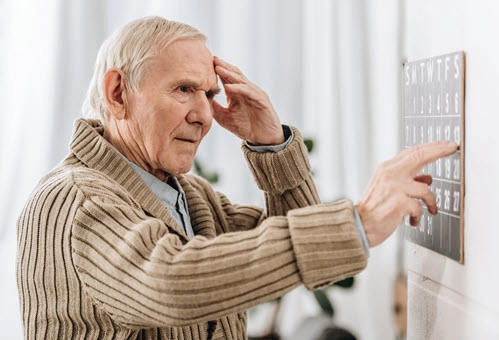MDS Alert
Use These Tips for Dementia Care During Pandemic
Try to preserve routine while focusing on human connection. Residents with dementia may fare best with structure, routine, and security, and the realities of COVID-19 have made it difficult for many facilities to provide the kind of care that residents need emotionally and mentally while still keeping them physically safe from the virus. With more than 5 million people living with dementia in the United States, and the intensity with which COVID-19 has affected nursing home residents, it is especially important to manage both resident care and infection control protocols with dementia in mind. The Medicare Learning Network recently offered tips for facilities to care for residents with dementia during the COVID-19 pandemic. Focus on Person-Centered Care One major aspect of caring for a resident with dementia is managing behavior — both residents’ behavior and staff responses to those behaviors. With COVID-19 requiring so many deviations from what was normal, including new protocols that may be physically uncomfortable for residents who are sensitive to restrictive accessories like face coverings, facility staff must be especially innovative and patient. “One of the most important aspects of providing quality dementia care is the ability to observe and respond to dementia-related behaviors,” says Douglas Pace, director of Mission Partnerships at the Alzheimer’s Association in Washington, D.C. Pace explains that behaviors associated with dementia are often a means of seeking attention for an unmet need or unrecognized intention. “They may include striking out, screaming, or becoming very agitated or emotional. And the care provider’s role is to observe and to attempt to understand what the person with dementia is trying to communicate,” he says. One major means of managing care for residents with dementia is, unsurprisingly, simply having enough skilled and knowledgeable staff. “Some concerns like falls, weight loss, dehydration, pressure ulcers, as well as incidents of elopement and resident altercations can offer insight into the sufficiency of the number of staff within a facility,” says Dara Graham, RN, a nurse consultant who works on policy and guidance in the Division of Nursing Homes at the Centers for Medicare & Medicaid Services in Baltimore. Staffing certainly affects person-centered care — as well as compliance. “A facility must ensure that there are sufficient number of skilled licensed nurses, nurse aides, and other nursing personnel to provide care and respond to each resident’s need; must ensure licensed nurse coverage 24 hours a day, except when waived; and ensure a licensed nurse is designated to serve as a charge nurse on each core duty, except when waived,” Graham says. Remain compliant by avoiding leaning on medication for convenient management of behavior, too; residents have the right to remain free from physical and chemical restraints. “Facilities should not initiate a chemical restraint to sedate the resident and keep him or her from walking into another resident’s room or getting too close to other residents,” says Cathleen Lawrence, RN, a nurse consultant who works on policy and guidance in the Division of Nursing Homes at the Centers for Medicare & Medicaid Services in Baltimore. Weigh Benefits of COVID Unit Managing the best protocols for mitigating the spread of the virus involves aims that may not mesh with what’s best for residents with dementia. A dedicated COVID-19 unit, for example, may be really tough on residents with dementia, even if they have contracted the virus, says Kara Jacobs Slifka, MD, an infectious diseases physician and medical epidemiologist with the Long-Term Care Team in the Division of Healthcare Quality Promotion at the Centers for Disease Control and Prevention in Atlanta. Moving a resident with dementia may cause behaviors like confusion, disorientation, anger, agitation, an increase in wandering, and a higher risk of falling, she says. Plus, moving a resident may be too little, too late. “Our experience has shown that once an individual in a memory care unit has been identified with COVID-19, there are likely to be others, especially with challenges implementing those infection prevention precautions. So, transmission may have already happened, and providers may determine that it’s safer to maintain care of residents with COVID-19 on that unit and with those dedicated personnel,” Slifka says. Organize Routines and Information Research from Project ECHO, which stands for Extension for Community Health Outcomes, suggests that residents with dementia can cope much better with COVID-19 precautions if they become a scheduled and regular part of the resident’s routine. For example, while staff may be doing a great job incorporating increased hand hygiene into their own routines, resident hand hygiene is often overlooked, Pace says. He notes that one community managed this issue by making handwashing an activity and creating a schedule around it. He says the residents loved this, and it helped with the facility’s infection control protocols as well. With residents spending so much time in their rooms right now, walking can be a welcome and important means of exercise. But to make it safer, try to have staff accompany a resident, with both wearing a face mask or covering, Pace suggests. Right now, it’s especially important to make person-centered care tangible. Incorporate your information collection and documentation skills by making forms for each resident with dementia. Project ECHO recommends a “What You Need to Know” form that incorporates contact information for the resident’s family and friends, and the best means of contacting and communicating updates with those people, as well as the best ways to contact and communicate with the resident and facility. You can make this form the one-stop shop for important information about the resident in case of an emergency or transfer, including adaptive devices like dentures, glasses, and hearing aids, as well as information pertinent to their wishes surrounding advanced care planning, Pace says. Other important information to include: the resident’s preferred name, their hobbies, their normal day-to-day structure or routine, and things that can trigger the resident into feeling upset or help calm them. You can also include assessment-like information, like an accounting of their remaining abilities, motor skills, and verbal processing and communication abilities and methods, Pace says. Having all this information in one dedicated place can remove barriers to staff providing the care and attention that individual residents need. Try These Ideas to Brighten Residents’ Days If you’re stuck on ideas to bring some festive spirit, or just plain brightness, to residents, try these. Encourage residents’ friends and family members put together care packages for the residents. Pace suggests including photographs, snacks, letters, books, or puzzles. Help staff who will be interacting with the resident by labeling any photos, especially if they include kids who may have grown since their last in-person visit! If residents are missing in-person activities, Slifka suggests following the lead of one community by organizing a doorway dance party event. Help residents to their doorways and then play music throughout the hall or wing so everyone can dance together, safely and physically distanced.

MDS Alert
- COVID-19:
Facilitate Safe Holiday Celebrations
Keeping residents safe, but not socially isolated, over the holidays is more important than ever. [...] - Care Planning:
Use These Tips for Dementia Care During Pandemic
Try to preserve routine while focusing on human connection. Residents with dementia may fare best [...] - Tips and Tricks:
Tidy Your To-Do List to Round Out 2020
Cleaning off your desk is a good way to end this year and start 2021. [...] - Reader Question:
Don’t Count on Elbow Bumps as Safe Alternative
Question: Many of our residents are really missing the connection and attention they used to [...] - Reader Questions:
CDC Recommends Alcohol-Based Sanitizers
Question: My hands are so dry from the constant washing. I don’t like the fragrance [...] - Reader Questions:
Reassure Beneficiaries of Cost-Coverage for Vaccination
Question: Now that several COVID-19 vaccines are closer to approval and distribution, will Medicare and [...] - Reader Questions:
Code ‘Edentulous’ If Resident Has This Condition
Question: One of our residents has dental implants in place of all of her natural [...]